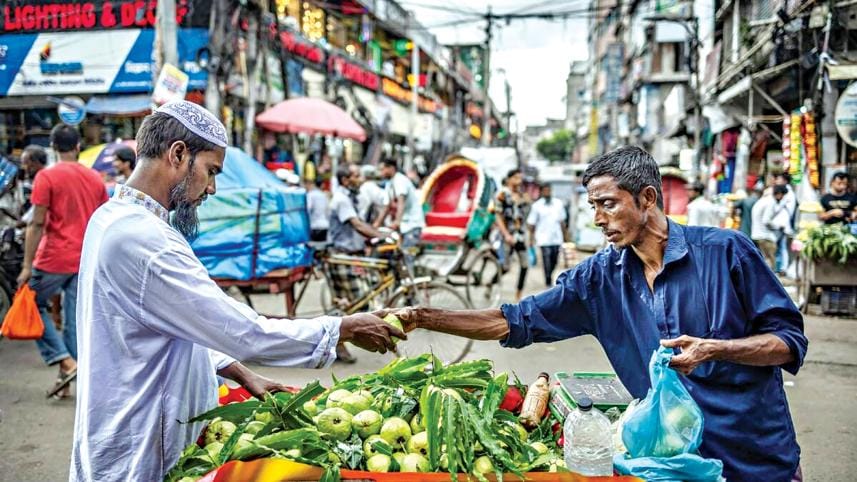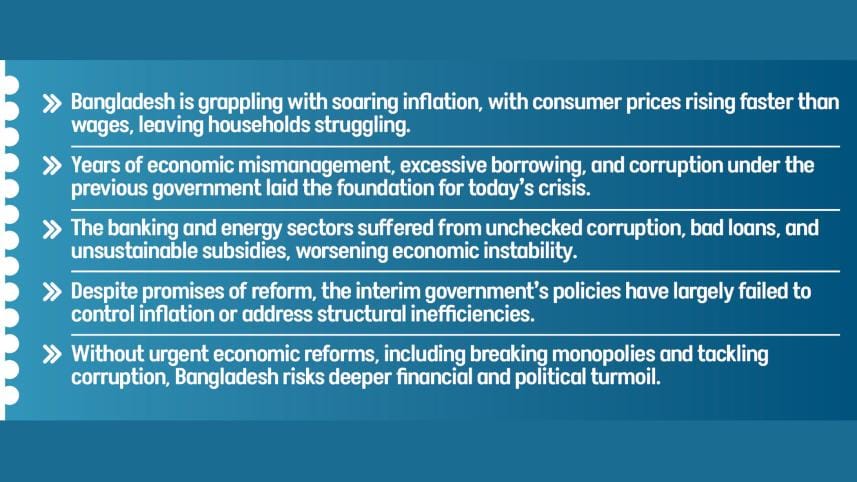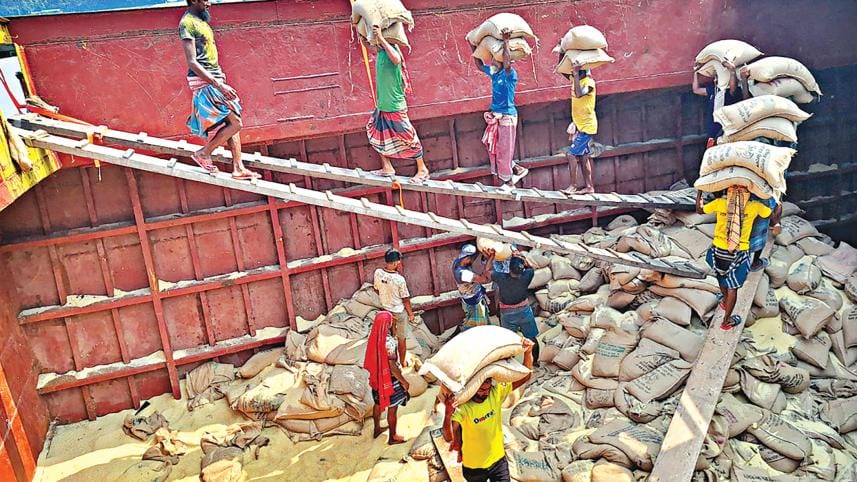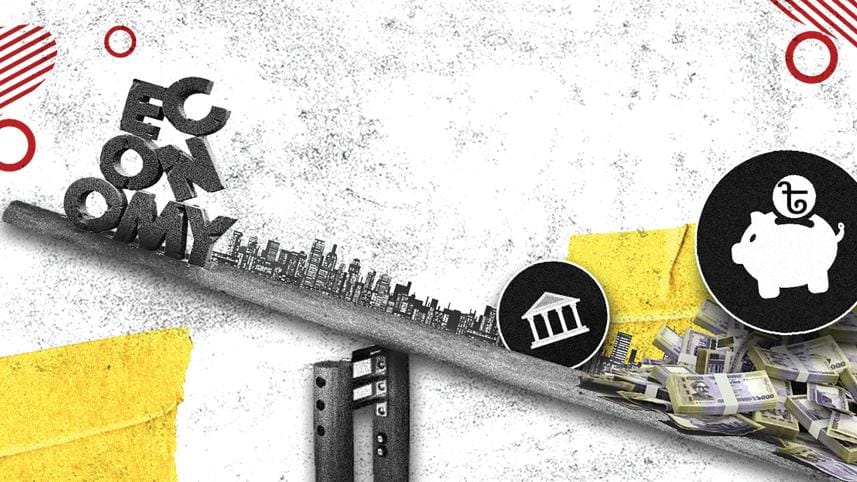Can we overcome our economic woes?

If you've been to a grocery store in Bangladesh lately, you've probably felt the sting of rising prices. For months, Bangladeshis have watched their purchasing power shrink as prices soared. Household spending ballooned, wages stagnated and economic frustration ran deep. But January brought a glimmer of relief—inflation has eased for the second straight month, offering a brief breather for struggling households.
The country's benchmark for measuring inflation, the Consumer Price Index, dipped to 9.94 percent in January from 10.89 percent in December. The biggest shift? Food inflation dropped to 10.72 percent from 12.92 percent, thanks to an influx of winter vegetables that helped stabilise prices. For families grappling with rising costs, this seasonal price dip has offered some reprieve.
Yet, while these numbers bring some good news, they don't change the bigger picture. For nearly two years, inflation has battered household budgets, forcing families to cut back on essentials. Wages haven't kept up, businesses are still struggling and the country's deeper economic flaws remain unresolved. The interim government, which came to power after the 2024 uprising, promised relief. But instead of taming the beast, they've been tossing out poorly thought-out policies that haven't made a dent. On top of everything else, the government raised the value-added tax on everyday goods. That backfired. Price monitoring? Mostly just talk.
But let's rewind a little. The mess didn't start with the interim government—it was years in the making. The previous administration, led by Sheikh Hasina, spent years talking up Bangladesh's economic success story, pointing to rising GDP numbers and megaprojects as proof of progress. But beneath the shiny infrastructure and flashy growth rates, cracks were forming. Inflation was creeping up, debt was piling on, and economic inequality was widening.

Hasina's go-to move was to blame external factors—global oil prices, supply chain disruptions and the pandemic. And while those things played a role, the real issue was a failure to prepare for economic shocks. There was little investment in food security, little effort to rein in monopolies controlling essential goods, and almost no real reforms to make Bangladesh's economy more resilient.
A recent report from the task force on economic reforms doesn't hold back. It details how years of policy missteps, unregulated borrowing, and crony capitalism during Hasina's tenure laid the foundation for today's economic crisis. The banking sector? "A bottomless mine of public funds indiscriminately extracted by a kleptocratic government," the task force said. The energy sector? Drowning in subsidies and mismanagement. Food prices? Manipulated by cartels that operated under the government's nose.
The economic chaos we're seeing now isn't just the result of global inflation or some temporary post-pandemic hiccup. A litany of policy failures made the crisis worse. One of the biggest problems was the government's addiction to borrowing. The Hasina administration loved big infrastructure projects—roads and bridges—but much of it was funded through unsustainable borrowing. Bangladesh's debt-to-GDP ratio soared, and when global economic conditions worsened, the country found itself trapped.

Then there was the energy crisis. Under Hasina, the government poured billions into subsidies for quick rental power plants—short-term electricity solutions that were supposed to be temporary but ended up draining public funds. Meanwhile, long-term investments in sustainable energy and local gas exploration were neglected. So, when global fuel prices surged, Bangladesh was left scrambling.
One particularly damning section in the task force report highlights how food inflation, which has been running between 10-14 percent since early 2023, was made worse by structural inefficiencies that were never addressed. The previous government ignored supply chain inefficiencies, allowing middlemen to take a cut at every stage, driving up prices for consumers. Rice, wheat, and oil prices didn't just rise because of global shocks—years of unchecked corruption and poor governance played a major role too.
The banking sector was another ticking time bomb. Instead of making meaningful reforms, the Hasina administration let politically connected businesses rack up billions in bad loans, leading to a fragile financial sector. Bangladesh's economy was teetering on the precipice.

And then came the student-led protests, a moment that revealed just how deep the frustration ran. A White Paper committee laid it all out: mass capital flight, policy failures and a financial system that had been gutted by a decade of reckless decision-making. The new government, headed by Professor Muhammad Yunus, wasted no time setting up teams to dig into the economic wreckage.
But while the interim government inherited a disaster, they haven't exactly been doing a stellar job fixing it. Inflation is still stubbornly high, eating away at household budgets, businesses are struggling to stay afloat, and the same market inefficiencies that plagued the previous administration remain firmly in place. The message is clear—without structural changes, the cycle of economic mismanagement will continue.
When Professor Yunus entered office, foreign exchange reserves were dwindling. His actions, including efforts to improve policymaking and restore confidence, appear to have averted a bigger economic crisis. "But the economy has still taken a hit, due to political unrest and the uncertainty it has sown for businesses and investors," the International Crisis Group said in a report on January 30.
The International Monetary Fund expects economic growth to rebound sharply and inflation to halve in the next fiscal year, but "a buoyant economy will require reforms to encourage local and foreign investment, tackle corruption and red tape, and diversify into new sectors."
"Conversely, failure to create enough jobs for Bangladesh's young, increasingly well-educated population risks sowing the seeds of future political unrest," Crisis Group said.
For ordinary people, all of this is more than just numbers on a spreadsheet—it's a daily struggle. Families are cutting back on spending. The purchasing power of the Bangladeshi taka is eroding.
The frustration is mounting, and unless something changes soon, the economic strain could spark more discontent. People are tired of promises, tired of policies that don't work, and tired of seeing their money disappear while a handful of elites get richer. Inflation isn't just an issue that can be ignored anymore—it's a crisis that's hitting every household. The government needs to stop running in circles and start making meaningful reforms before it's too late—and not shoot the messenger just for telling the inconvenient truth.
So, what's the way out? Bangladesh needs to break up monopolies in essential goods markets, enforce real price regulation, and invest in a smarter, more resilient economy. But whether the interim government has the political will—and the time—to pull off these reforms remains to be seen.



 For all latest news, follow The Daily Star's Google News channel.
For all latest news, follow The Daily Star's Google News channel.
Comments